Have you ever heard of Water hardness? Relevant information can often be found in guides, on laundry detergents and much more. There are various measuring units for hard water. There's German hardness, French, Russian and English hardness as well as the American measurement in parts per million (ppm) and a few others. As this article was originally written in German, we advise you to use a calculator from °dH (German hardness) to your desired measuring unit.
Hard water and soft water
In the German-speaking coffee scene you always hear about °dH as a unit for water hardness. The hardness levels are divided into three hardness ranges . Up to 8.4 °dH water is considered soft (range 1), from 8.4–14 °dH it is considered medium (range 2) and above 14 °dH it is considered hard (range 3). To put it simply, water hardness results from the concentration of calcium and magnesium in the water.
Water hardness, alkalinity and pH
The second value that is crucial for water for making coffee is alkalinity (not to be confused with basicity). The alkalinity value of water provides information about how much acid it can bind. Although this value plays a role in the taste of the coffee, it is difficult to adjust. That's why we'll only briefly address it here.
The lower the hardness of water, the lower the degree of alkalinity. Usually their value is below the overall hardness of the water. So if you use particularly soft water, you usually emphasize the acids in coffee.
The third value, which is relevant for the ideal coffee water, is probably much more common. We are talking about the pH value, which describes how acidic or basic an aqueous solution is. The scale ranges from 0 (very acidic) to 14 (very basic or alkaline). A neutral solution, e.g. B. most drinking water has the value 7.
The ideal water hardness for coffee
When it comes to the ideal water hardness for coffee, relatively extensive information is often given. Some guides recommend water with 2 °dH, citing its particularly gentle properties for portafilters. The background: The more minerals there are in the water, the more likely limescale is to build up in the device and the more often we have to clean it. We're happy to accept that for a better coffee taste, especially since we have to clean our portafilter machine regularly anyway.
So let's now come to the ideal water hardness for the taste of coffee. Here again, it depends on the preparation method you choose. When using a portafilter for espresso, the range is higher than when preparing espresso using a hand filter. This is also due to the fact that the water content in an espresso is lower and therefore does not play such a big role in sensory terms.
The softer the water, the more acidic the coffee. Conversely, hard water tends to produce bitter notes. A high calcium content ensures more bitterness, while a high magnesium content ensures an astringent mouthfeel. It is worth noting that with everything we consume, you build a habit for hard or soft water, depending on what you usually consume. This means that no two persons will taste exactly the same in water and/or coffee.
Water hardness for espresso
When preparing coffee with the portafilter, a total hardness of around 5 °dH is recommended. This is how you get a balanced, balanced-tasting espresso.
Water hardness for filter coffee
When preparing coffee with the hand filter, a total hardness of 2–3 °dH is recommended. Since coffee consists of over 98% water, too many minerals quickly spoil the taste of the coffee. It is therefore advisable to use suitable water, especially with higher-priced specialty coffee .
Measure water hardness and determine pH value
There are various ways to find out how soft or hard the water from your tap is. One is to check with your local water supplier. However, it may well be that he cannot or does not want to give a clear answer. In urban areas, this is often because tap water comes from different reservoirs at different times of the day.
The solution? Test it yourself!
Today there are countless providers of drinking water tests, which usually work via titration. We put some tap water in a container and then drip a liquid (measuring solution) into it. We then use a test strip that we hold in the mixture to determine values such as total hardness, alkalinity and pH. Some tests also provide information about various pollutants in the water. Corresponding test kits are available from around €15 and up.
Soften hard water
Many companies offer systems that can soften water. Table filters and water filters with a fixed water connection promise to reduce the degree of hardness by partially filtering out calcium and magnesium.
Manufacturers of table filters include Brita and BWT. The filters roughly halve the hardness of water per pass. So if hard water comes out of our tap, we may have to filter it several times using table filters for coffee preparation. The situation is different with filters with a fixed water connection, with which we can precisely adjust the degree of hardness using the amount of raw water, i.e. unfiltered water.
In our training and tasting rooms in Freiburg, Germany, as well as in our flagship store Café Marcel in Freiburg's Stadtgarten, we use a fixed water connection filter system from BWT with reverse osmosis . The system removes minerals from the water, which are then automatically added back in the desired amount (remineralization). The fixed water systems are also available without reverse osmosis, but even then they are rather expensive (~1000 € + approx. 700 € per year for new filter cartridges). But this can also be worthwhile for private households, especially since table filter systems are rarely cheap.
This is how you make soft water hard
A note in advance: Water from German taps is generally harder than desired for making coffee, as the overview on Wasserhaerte.net shows. Therefore it is usually not necessary to increase the hardness, but rather to decrease it. Regarding the information on the page linked above, it should be said that anyone can do this and you should therefore test it yourself if you want to be on the safe side.
The easiest way to make soft water harder is to mix it with harder water (called blending). Purchased mineral water, for example, is suitable for this.
The ideal pH value of water for coffee
Let's keep it short and sweet: The ideal pH value for your coffee water is 7. This is neither acidic nor alkaline, but the golden mean on the pH scale and therefore tastes neutral. You can easily determine the pH of your tap water with simple and affordable water testing kits.
The best bottled water for coffee
If your tap water is unsuitable for making coffee, e.g. For example, if the water is particularly hard, you can also buy bottled water instead of filter solutions. In the long run, however, this can be quite expensive, especially if you rely on the often recommended Volvic.
The mineral water from Auvergne, France, works well as coffee water, but there are also cheaper alternatives. Many of them are summarized in the water database that Oliver from the Coffee Network community provides (German). Here, coffee fans enter the hardness levels of mineral water. When it comes to discount brands, it should be noted that water from different sources is sometimes sold under the same brand.
It is a persistent myth that coffee removes water from the body. In an article by SWR-Wissen (German) we learn that coffee has a diuretic effect, but we don't have to drink more water to compensate for this.
Additional information
If you would like to delve deeper into the topic of coffee water, we recommend the detailed article by Kaffeemacher:innen from Basel, Switzerland. Jim Schulman's Insanely Long Water FAQ is also very informative.
Important things to consider for coffee water
- Water makes up up to 99% of your coffee and can therefore have a significant impact on the taste.
- The decisive factor for the taste of drinking water is the water hardness, which, in Germany, is given in degrees of German hardness (°dH).
- For espresso we recommend a water hardness of ±5 °dH, for filter coffee 2–3 °dH. The pH value should be 7.
- You can check the hardness and pH value of your tap water with appropriate water test kits (from €15 and up).
- Tap water is usually harder than recommended for coffee. You can soften your water with table water filters or filter systems with a permanent water connection.

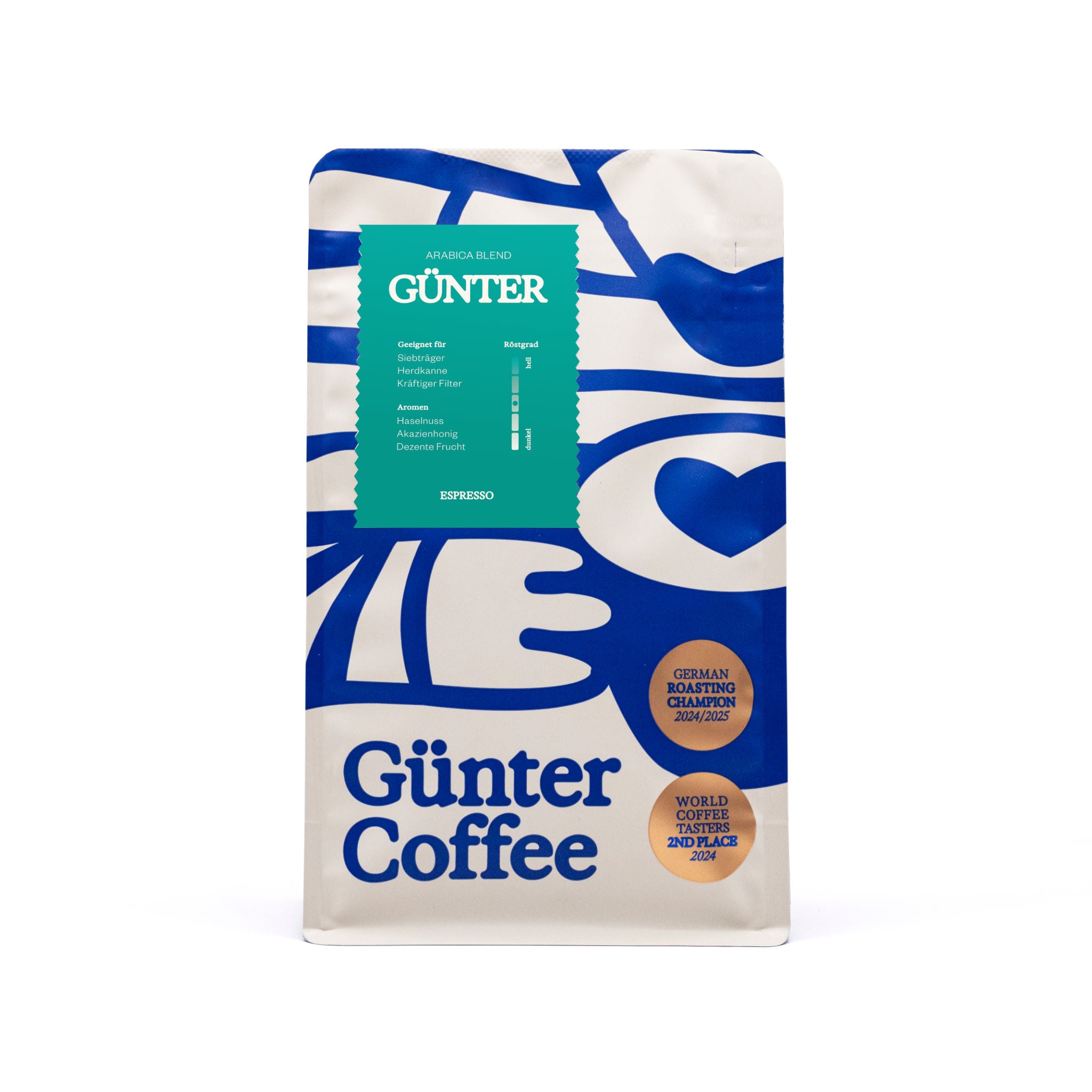
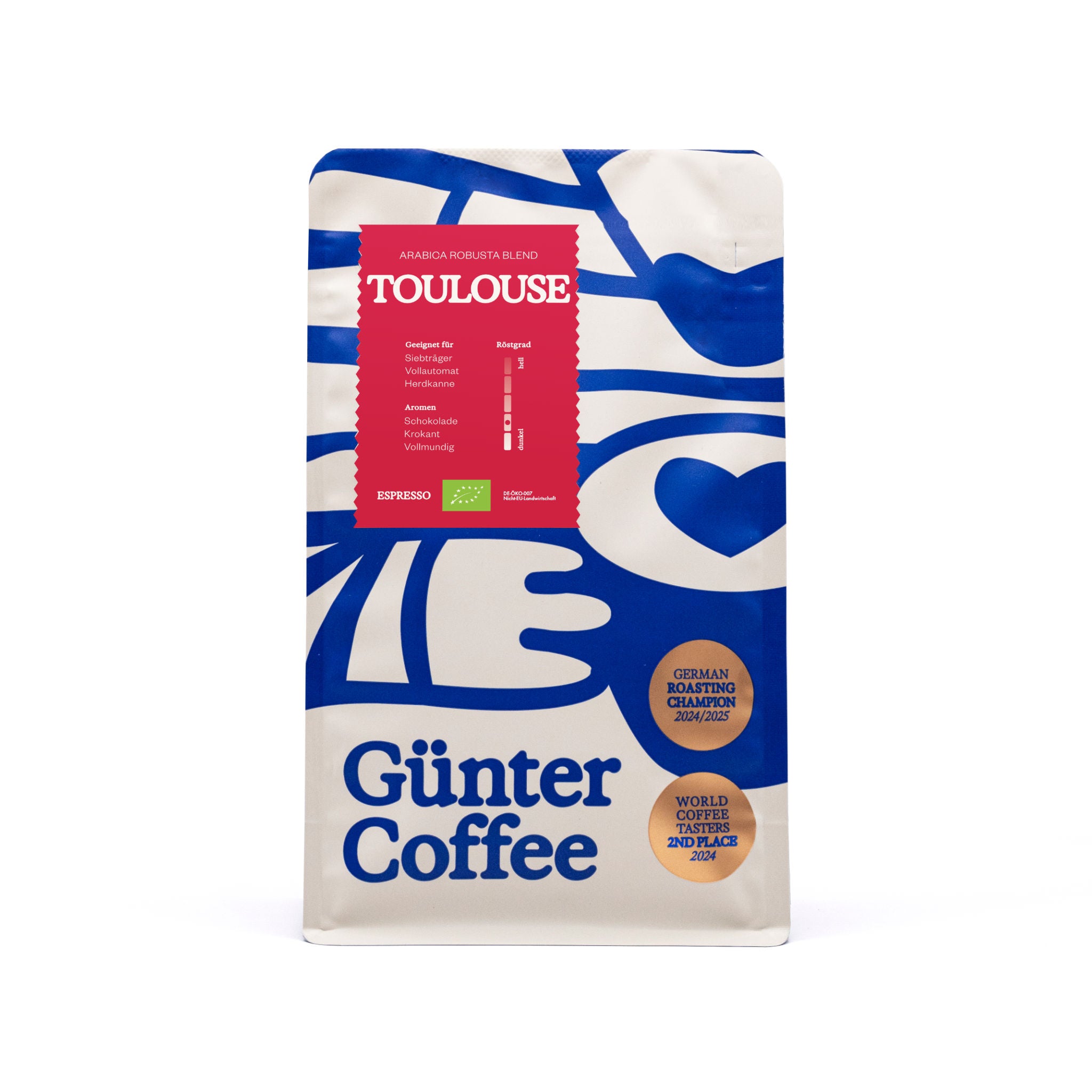
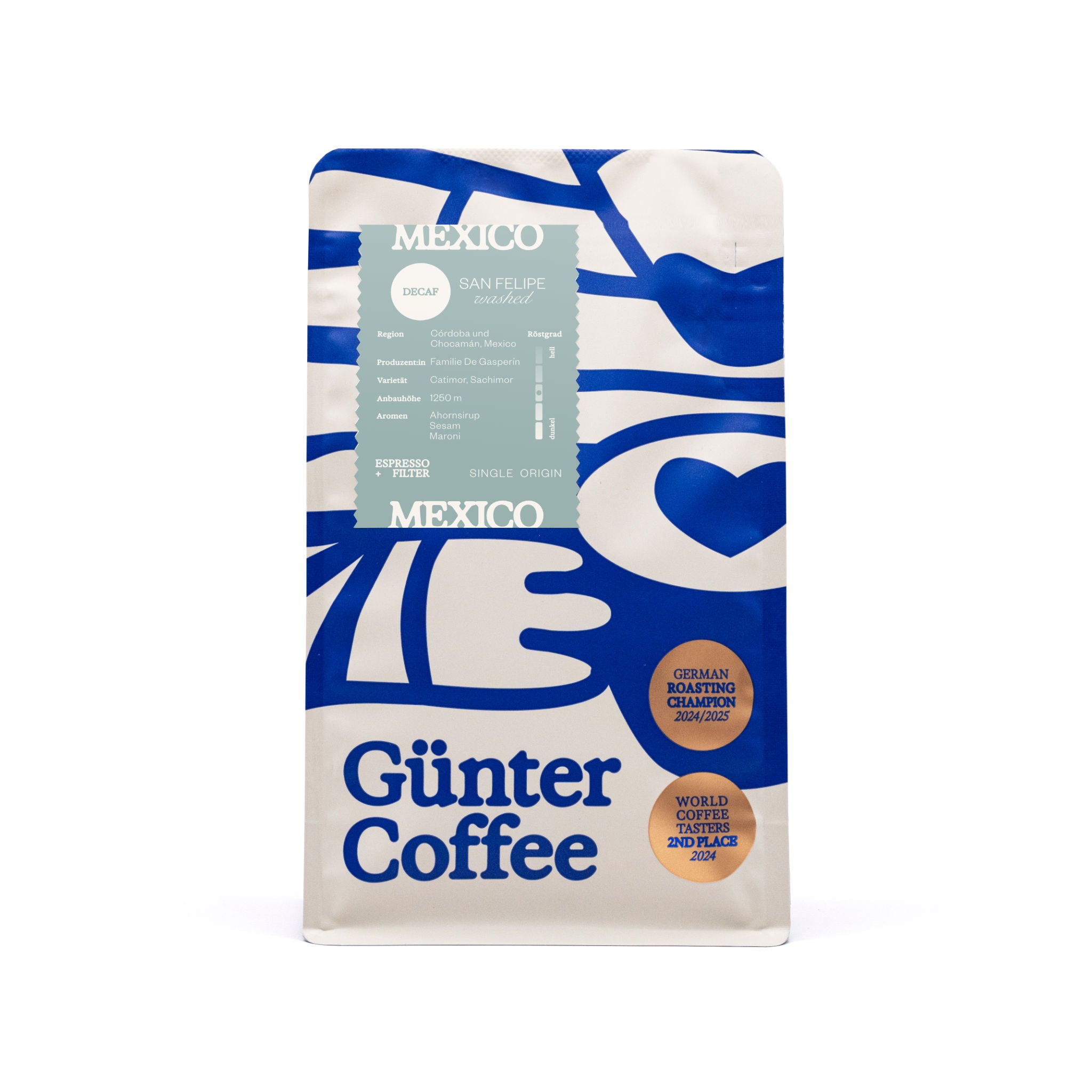
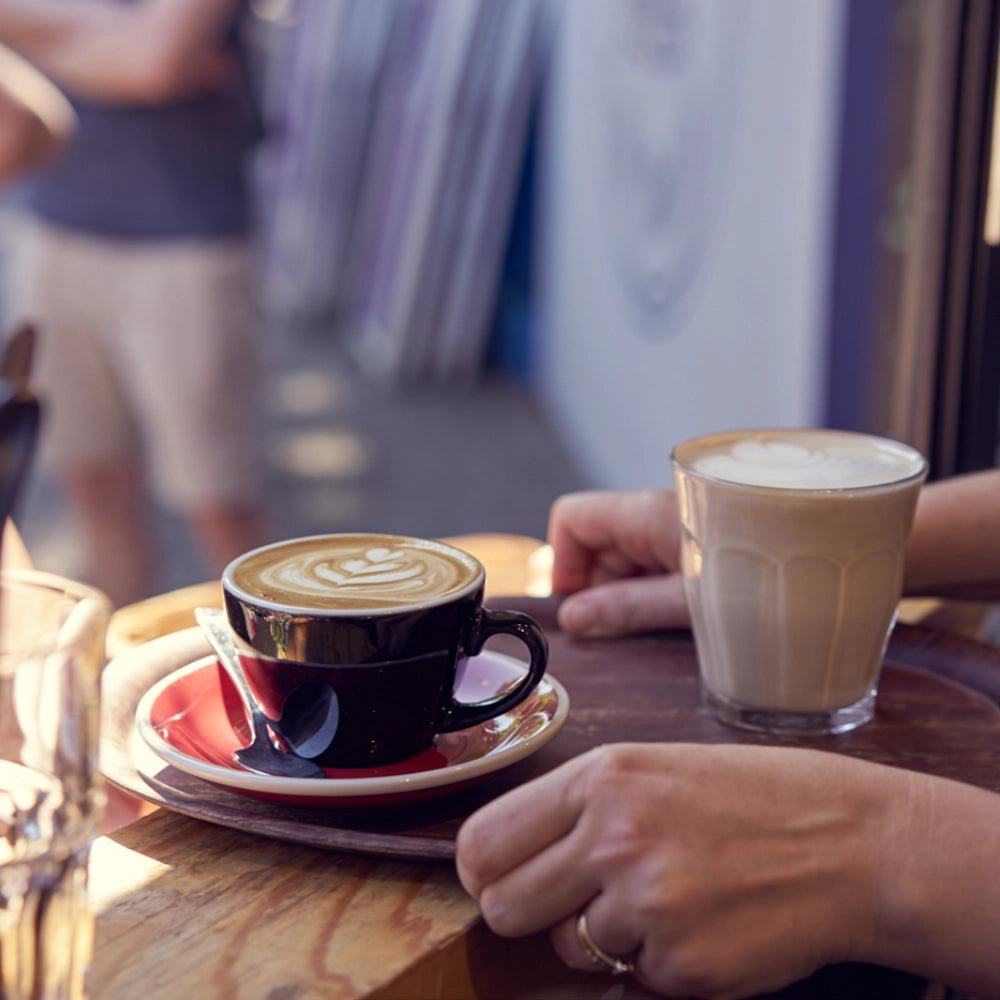
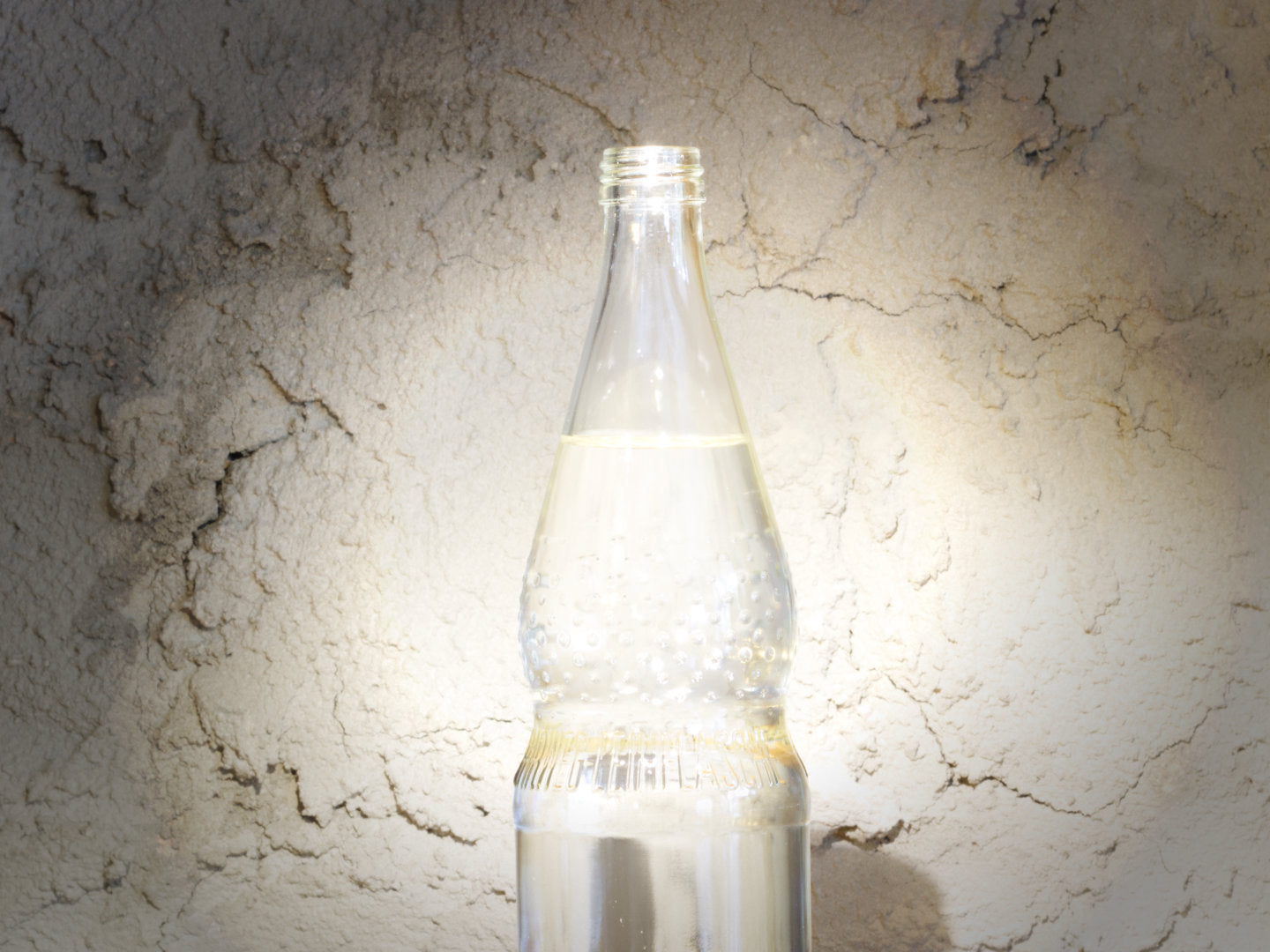

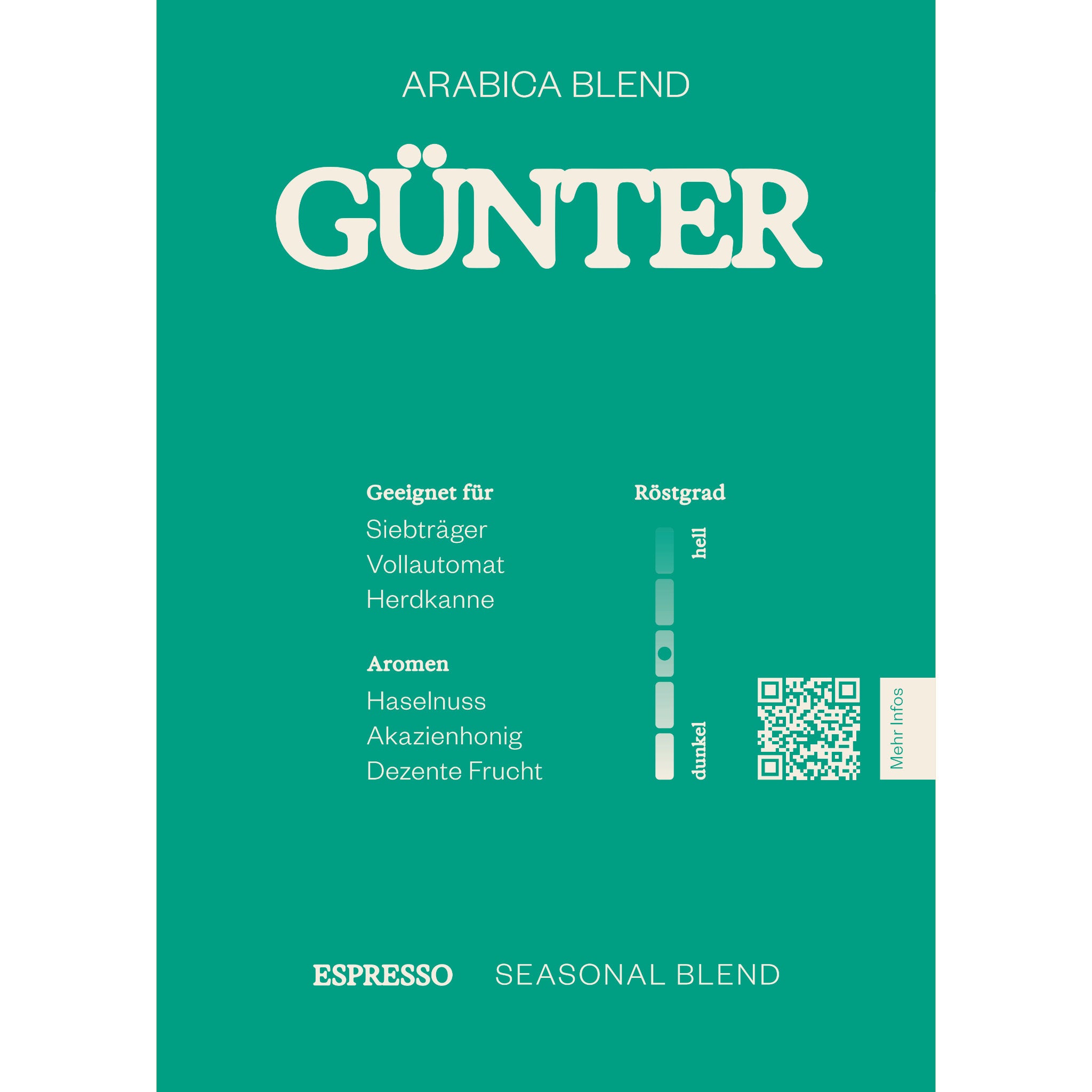
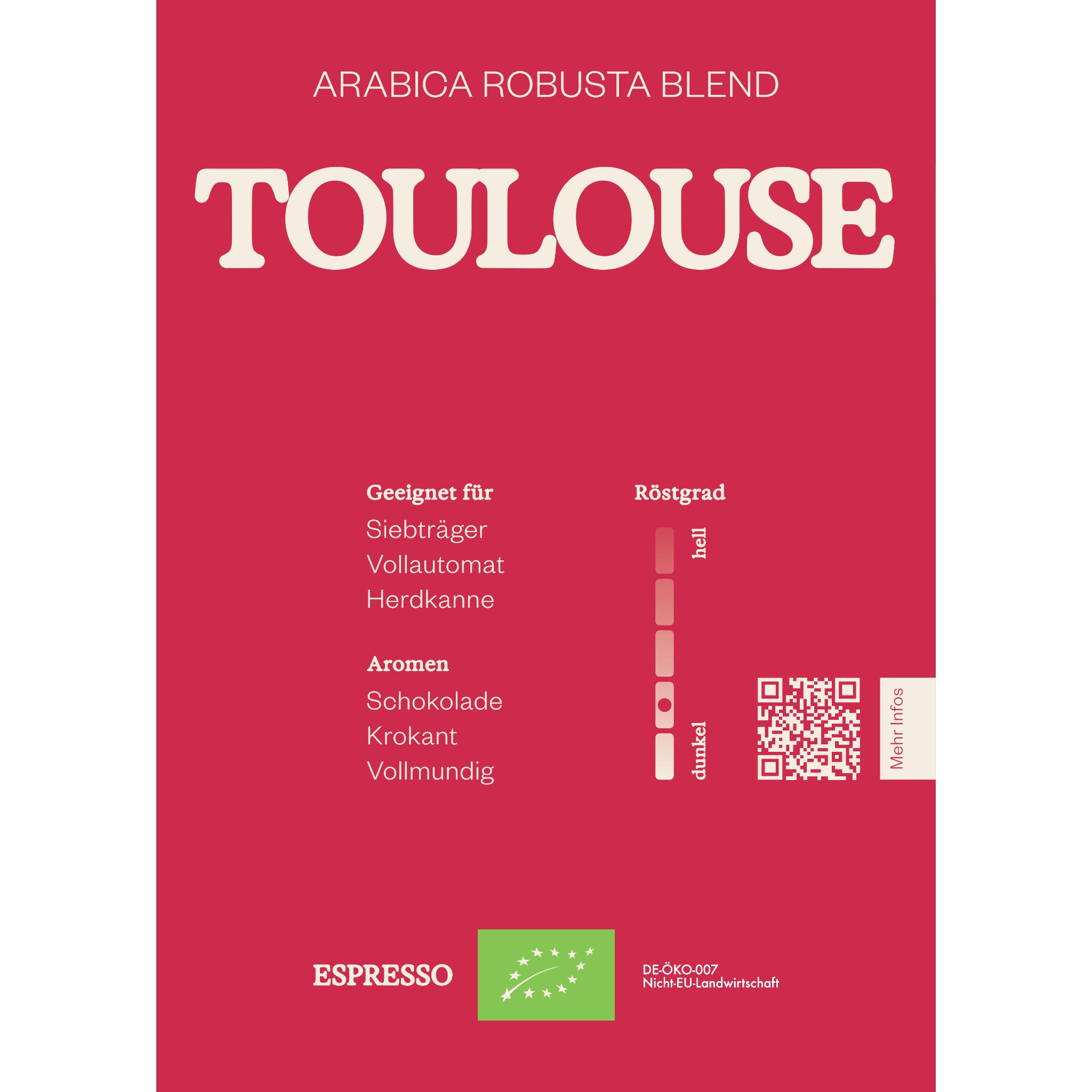
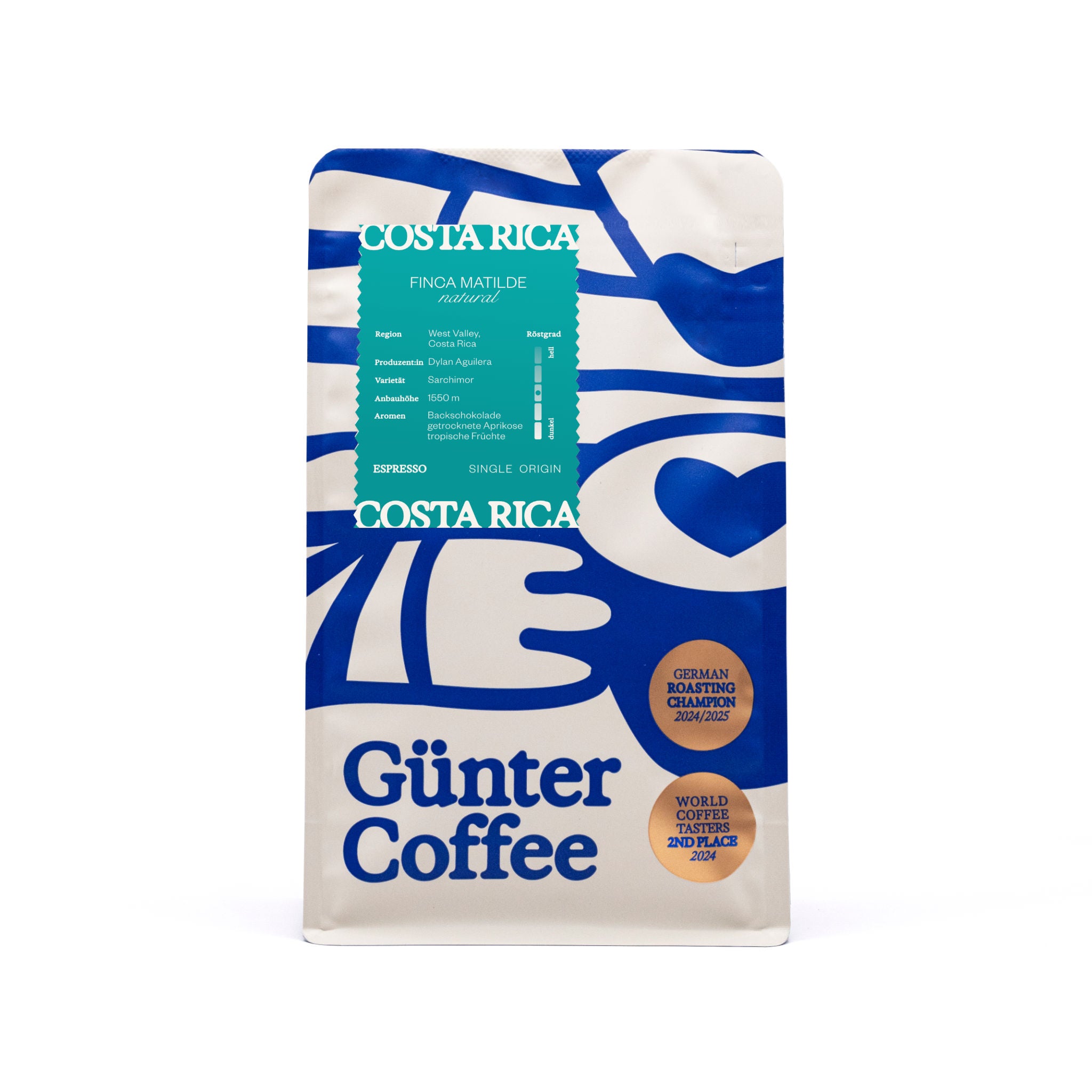
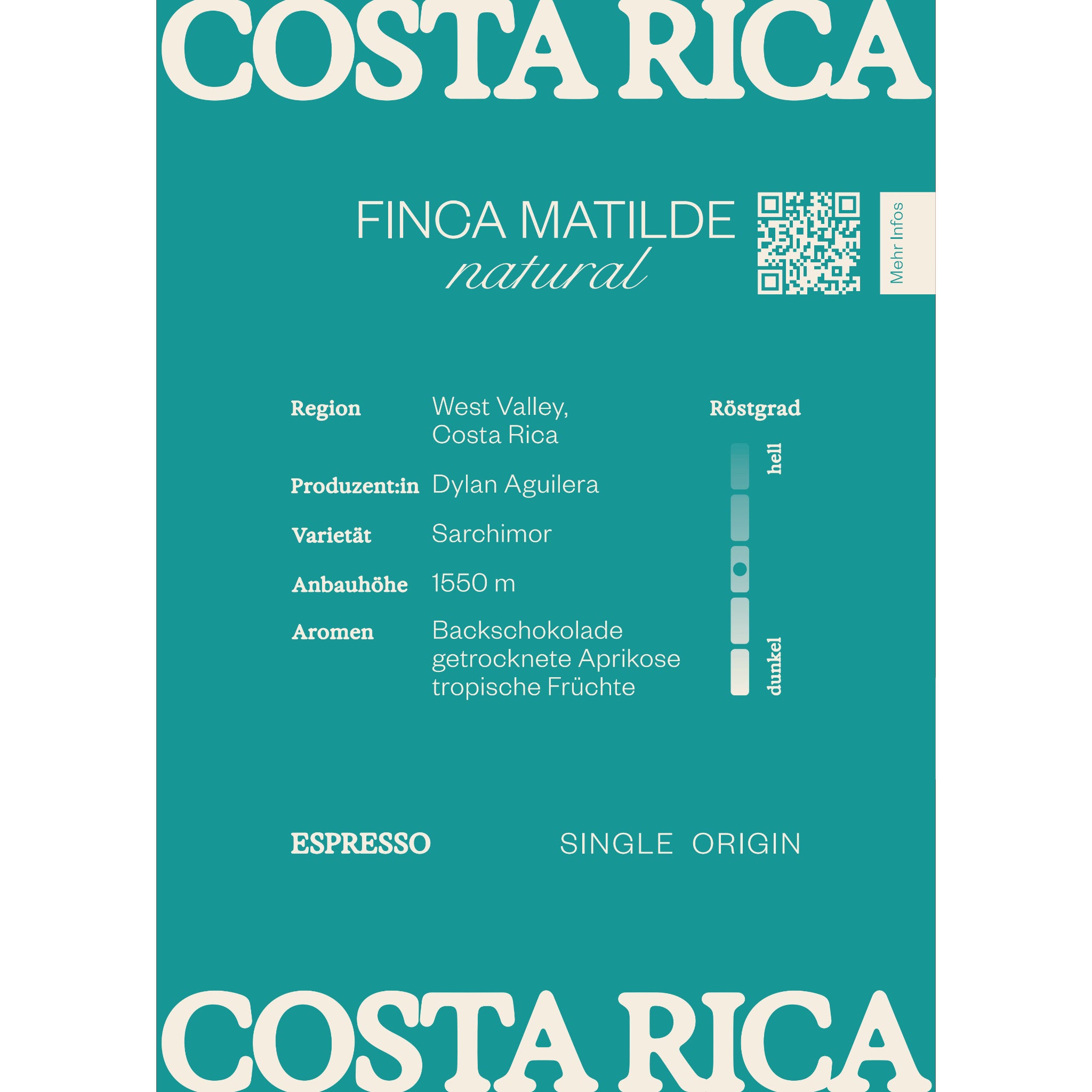



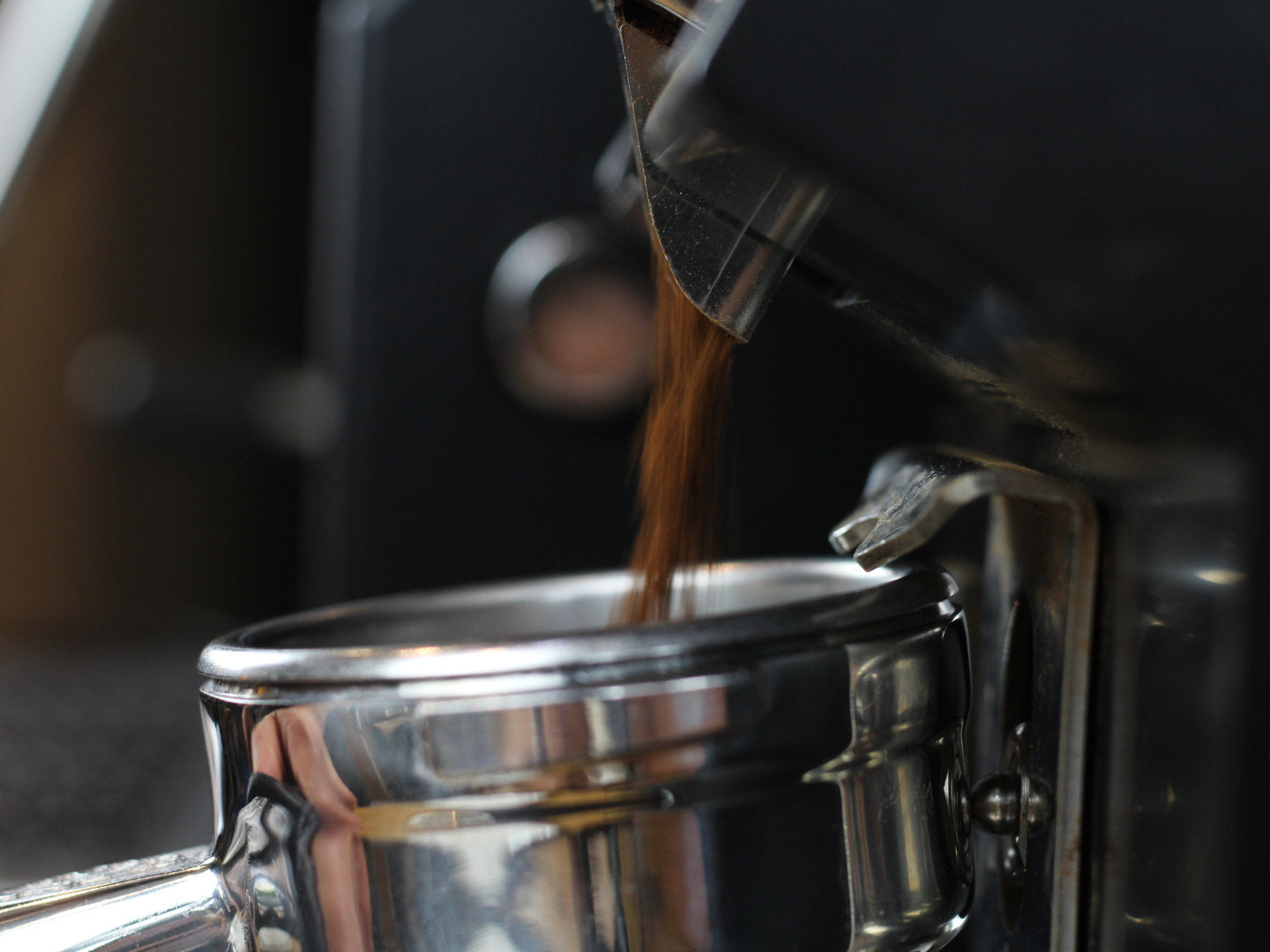
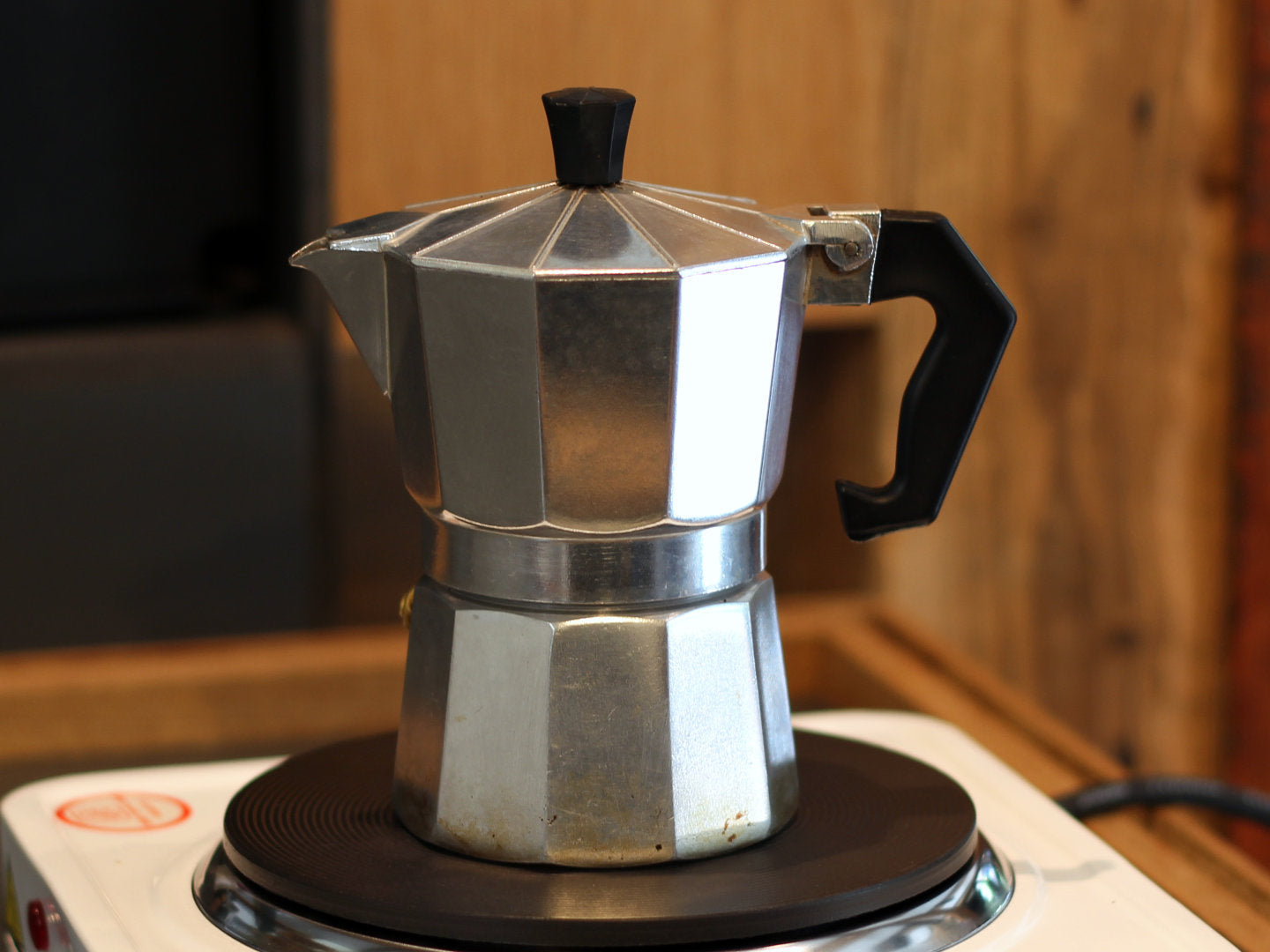




7 comments
Nico | Günter Coffee Roasters
@Hilko: Danke für deinen Kommentar. In unserem Café nutzen wir eine Wasserfilteranlage von BWT (ROC), die mit dem Umkehrosmoseverfahren arbeitet und das Wasser anschließend, gemäß unserer Einstellungen, remineralisiert. Kleiner dimensionierte Anlagen gibt es auch für den Hausgebrauch. Bei einem hohen Kaffeekonsum und/oder dem allgemeinen Wunsch nach einem anderen Wassergeschmack des Leitungswassers, lohnt sich die Anschaffung.
@Moritz und Claudio: Vielen Dank für eure Kommentare! Schön, dass wir euch mit dem Artikel weiterhelfen konnten.
@Hilko: Danke für deinen Kommentar. In unserem Café nutzen wir eine Wasserfilteranlage von BWT (ROC), die mit dem Umkehrosmoseverfahren arbeitet und das Wasser anschließend, gemäß unserer Einstellungen, remineralisiert. Kleiner dimensionierte Anlagen gibt es auch für den Hausgebrauch. Bei einem hohen Kaffeekonsum und/oder dem allgemeinen Wunsch nach einem anderen Wassergeschmack des Leitungswassers, lohnt sich die Anschaffung.
@Moritz und Claudio: Vielen Dank für eure Kommentare! Schön, dass wir euch mit dem Artikel weiterhelfen konnten.
Hilko
Hey zusammen, danke für den informativen Artikel. Wie remineralisiert ihr euer Wasser? Nutzt ihr eine Rezeptur wie von Third Wave Water oder wie kann man sich das vorstellen? Liebe Grüße!
Hey zusammen, danke für den informativen Artikel. Wie remineralisiert ihr euer Wasser? Nutzt ihr eine Rezeptur wie von Third Wave Water oder wie kann man sich das vorstellen? Liebe Grüße!
Claudio Bel
Vielen Dank für den informativen Artikel. Ich habe hier gefunden, was ich gesucht habe, um mein persönliches Kaffeeerlebnis eventuell noch optimieren zu können. Auch hilft er mir bei der Entscheidung, evtl. einen Wasserfilter anzuschaffen oder eben mit Mineralwasser zuzubereiten.
Vielen Dank für den informativen Artikel. Ich habe hier gefunden, was ich gesucht habe, um mein persönliches Kaffeeerlebnis eventuell noch optimieren zu können. Auch hilft er mir bei der Entscheidung, evtl. einen Wasserfilter anzuschaffen oder eben mit Mineralwasser zuzubereiten.
Moritz Haupt
Wertes guentercoffee Team,
vielen Dank für den tollen, mit Fakten sowie allen weiterführenden Informationen umfassenden Artikel: So soll es einfach mal sein! Ich kann als „Caffè Aficionado “ die Wichtigkeit rund um das Thema Wasserfiltration im Haushalt nur unterstützen und die spannenden Fakten mit dem Chemiewissen aus der 8. Klasse nochmal in meinem daily Espresso bestätigen🤓
Weiter so🤠🙋♂️
Viele Grüße aus Dresden
Moritz
Wertes guentercoffee Team,
vielen Dank für den tollen, mit Fakten sowie allen weiterführenden Informationen umfassenden Artikel: So soll es einfach mal sein! Ich kann als „Caffè Aficionado “ die Wichtigkeit rund um das Thema Wasserfiltration im Haushalt nur unterstützen und die spannenden Fakten mit dem Chemiewissen aus der 8. Klasse nochmal in meinem daily Espresso bestätigen🤓
Weiter so🤠🙋♂️
Viele Grüße aus Dresden
Moritz
Nico | Günter Coffee
@Ute: Wir wollen hier niemanden verunsichern, sondern aufklären. Uns vorzuwerfen, dass wir “jeden Tag Leute verunsichern” wollen, ist ganz schön seltsam und mit vollkommen unverständlich. Nirgendwo im Artikel schreibe ich, dass Leitungswasser für Kaffee ungeeignet ist. Ebenso habe ich nirgends behauptet, dass Leitungswasser in irgendeiner Weise gefährlich wäre.
Vielmehr habe ich aufgezeigt, was hartes und weiches Wasser für den Kaffee bedeuten und wie man den Härtegrad testen kann. Dass Wasser mit 1 °dH den besten Kaffee ergibt, kann man so nicht sagen, da in der Regel jeder und jede an “sein” Leitungswasser gewöhnt ist. Es ist also Gewohnheitssache, welches Wasser angenehm oder unangenehm schmeckt – auch im Kaffee. Alles Übrige zu Säuren und Bitterstoffen in Verbindung mit der Wasserhärte wird oben ausführlich erklärt.
Ich weiß nicht, was dich dazu bewegt hat, deinen Kommentar zu verfassen, aber mit dem vorliegenden Artikel hat er leider wenig zu tun.
@Ute: Wir wollen hier niemanden verunsichern, sondern aufklären. Uns vorzuwerfen, dass wir “jeden Tag Leute verunsichern” wollen, ist ganz schön seltsam und mit vollkommen unverständlich. Nirgendwo im Artikel schreibe ich, dass Leitungswasser für Kaffee ungeeignet ist. Ebenso habe ich nirgends behauptet, dass Leitungswasser in irgendeiner Weise gefährlich wäre.
Vielmehr habe ich aufgezeigt, was hartes und weiches Wasser für den Kaffee bedeuten und wie man den Härtegrad testen kann. Dass Wasser mit 1 °dH den besten Kaffee ergibt, kann man so nicht sagen, da in der Regel jeder und jede an “sein” Leitungswasser gewöhnt ist. Es ist also Gewohnheitssache, welches Wasser angenehm oder unangenehm schmeckt – auch im Kaffee. Alles Übrige zu Säuren und Bitterstoffen in Verbindung mit der Wasserhärte wird oben ausführlich erklärt.
Ich weiß nicht, was dich dazu bewegt hat, deinen Kommentar zu verfassen, aber mit dem vorliegenden Artikel hat er leider wenig zu tun.
Ute Plank
Hallo, ich stelle fest, dass Euch jeden Tag etwas Neues einfällt, Leute zu verunsichern.
Dass man zum Kaffeekochen kein Leitungswasser nehmen soll ist absoluter Schwachsinn.
Wo ich wohne hat das Leitungswasser Härtegrad 1, d.h. es ist weich. Das gibt den besten Kaffee.
Extra Wasser zu kaufen ist nur Geldmacherei bzw. Abzocke. Schon seit Jahrzehnten kocht man Kaffee mit Leitungswasser und daran ist höchstwahrscheinlich noch keiner gestorben.
Für mich ist dieser Artikel Schwachsinn. Tut mir leid.
Mit freundlichen Grüßen
Ute Plank
Hallo, ich stelle fest, dass Euch jeden Tag etwas Neues einfällt, Leute zu verunsichern.
Dass man zum Kaffeekochen kein Leitungswasser nehmen soll ist absoluter Schwachsinn.
Wo ich wohne hat das Leitungswasser Härtegrad 1, d.h. es ist weich. Das gibt den besten Kaffee.
Extra Wasser zu kaufen ist nur Geldmacherei bzw. Abzocke. Schon seit Jahrzehnten kocht man Kaffee mit Leitungswasser und daran ist höchstwahrscheinlich noch keiner gestorben.
Für mich ist dieser Artikel Schwachsinn. Tut mir leid.
Mit freundlichen Grüßen
Ute Plank
Simon
Super Artikel mit allen Infos, die ich suchte! Vor allem weiß nun, auch dank der offenen Daten unserer Wasserwerke, dass ich mit einem Brita-Filter fast punktgenau die richtigen Werte erreiche.
Super Artikel mit allen Infos, die ich suchte! Vor allem weiß nun, auch dank der offenen Daten unserer Wasserwerke, dass ich mit einem Brita-Filter fast punktgenau die richtigen Werte erreiche.